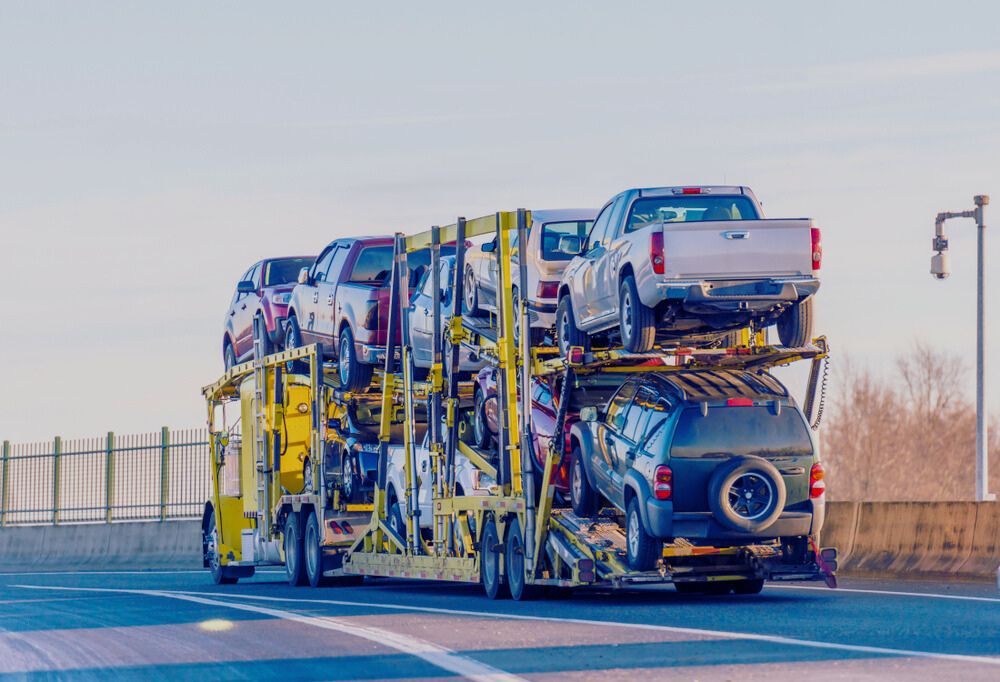When you’re seeking quotes from different auto transport companies, you may encounter various offers related to insurance during transit. If this is your first time shipping a vehicle, it can be difficult to know what to look out for.
In this blog post, we will give you a few pointers to help you learn more about auto transport insurance, so you can make informed decisions and ensure that your vehicle is well-protected during its journey.

Navigation
Do You Need Your Own Insurance to Ship A Vehicle?
The short answer is no, you do not need your own insurance to ship a vehicle. Carriers are required to have insurance, and brokers are bonded to ensure compliance. However, customer insurance does not always protect the vehicle in transit. Be sure to check with your insurance agent to find out if your policy will remain active while the transport company transports your vehicle.
Who Has The Auto Transport Insurance: Broker Vs. Carrier
Understanding who holds the insurance is crucial.
- Carrier: The carrier is the company responsible for physically transporting your vehicle. They must have both liability and cargo insurance.
- Broker: Brokers are licensed and bonded, and their role is to connect you with reliable carriers. They check the insurance of the carriers for you, ensuring everything is in order. However, the broker’s bond typically does not cover damages to your vehicle, as the responsibility would lie with the carrier.
What Types of Insurance Do Carriers Have? Liability Vs. Cargo Insurance
Carriers generally have two types of insurance:
- Liability Insurance: This covers damage to property or injury to others if the truck driver is at fault in an accident. Companies that transport vehicles are required to carry at least $1,000,000 in liability insurance.
- Cargo Insurance: This covers damage to your vehicle while it’s being loaded, transported, or unloaded by the carrier. Coverage usually ranges between $150,000 and $500,000, but this amount is split across all the vehicles being transported on the carrier’s truck. If your are shipping a very expensive vehicle, double-check with the auto transport company to make sure that the total cargo insurance is sufficient to cover its actual cash value in the event of a total loss.
What Does Liability Insurance Not Cover?
Liability insurance comes with various exclusions, which are standard practices in the auto transportation industry. For example, neither the transport company nor the carrier will be responsible for damages such as damage to undercarriage, exhaust system, suspension, and other mechanical components or damage or fines incurred because of personal or household items left in the vehicle.
How To Check A Carrier’s or Broker’s Auto Transport Insurance
A reputable auto transport company can provide you with a certificate of insurance of the carrier and will be listed as an additional certificate holder at the bottom of the document.
Alternatively, you can request the carrier’s MC or DOT numbers and check their credentials in the Federal Motor Carrier Safety Administration’s (FMCSA) public portal for free at any time. This will give you peace of mind knowing that you are dealing with a legitimate and insured company.
What Does Auto Transport Insurance Cost?
Reputable auto transport companies include insurance in their prices and will never offer to transport your vehicle without proper insurance. It’s essential to verify that insurance is part of the service cost to avoid any unexpected expenses.
How Much Does Auto Transport Insurance Cover?
Typically, auto transport insurance covers a $1,000,000 in liability and between $150,000 and $500,000 in cargo insurance. Enclosed carriers, which are often used for high-end or classic cars, typically offer a higher coverage and carry less vehicles. Beeline Auto Transport can help you decide if you need additional coverage based on your vehicle’s value.
How Is An Auto Transport Insurance Claim Filed?
If your vehicle is damaged during transport, the claim is filed through the carrier’s insurance. Reputable auto transport brokers will guide you through this process.
Unfortunately, many auto transport brokers will simply hand you off to the carrier and let you deal with the aftermath of the incident. But that’s not the Beeline way.
As your trusted auto transport company, we take a hands-on approach. If there’s damage, let us know right away. We’ll step in to contact the carrier and assist you in filing a damage claim. We’re with you every step of the way, ensuring the claim is filed correctly and managed promptly by the carrier. At Beeline Auto Transport, we stay involved until your damage claim is fully settled. Your peace of mind is our priority.
The bill of lading is crucial for your claim as it documents the condition of your vehicle before and after transport. Be sure to inspect your vehicle thoroughly at delivery and note any damages before signing the bill of lading.
Final Thoughts
When shopping around for auto transport quotes, it’s crucial to be thorough and inquisitive, especially regarding insurance coverage. Don’t hesitate to ask detailed questions about the insurance policies that each company offers. At Beeline Auto Transport, we try to make this process as easy as possible. We vet potential carriers for you and choose the appropriate insurance coverage for your vehicle from our network of skilled and trusted drivers.
To ensure your peace of mind, you can always request a certificate of insurance from Beeline Auto Transport once we assign your load to a carrier. This certificate will provide you with definitive proof of the coverage in place, detailing what is and isn’t covered during the transport.


